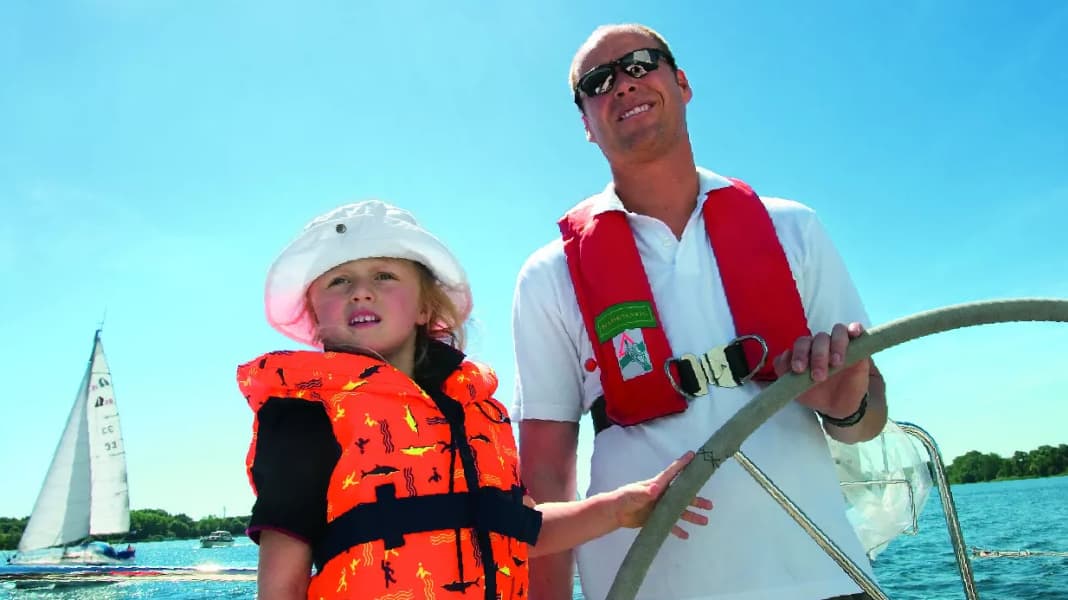
You can also read in this series:
People want to be able to control their own lives and destiny
Expectations are one of those things. They express our thoughts in relation to people or situations and take place in our imagination. This is where the dilemma often begins. Because in the vast majority of cases, expectations are neither fulfilled nor exceeded. Instead, they capsize in the gusts of reality.
It's the same, especially when it comes to summer holidays, this supposedly best time under sail that seems to be covered by a gigantic shelf cloud. You look forward to it all year round, planning destinations, anchor stops, sightseeing, writing equipment lists and piling up more and more anticipation for these two, three, four weeks on the water. This is a marvellous way to avoid many a dip in your daily routine. You probably know these phrases: "Just one more month, then ...!"
Just one more month, then ...!
However, this results in a frighteningly long piece of paper full of illusions. After all, we want everything to be different from day one of our holiday: We want to arrive at the boat without stress and traffic jams. We want good weather, sunny days and balmy nights. The crew should always be in a good mood. Illnesses should stay away, important utensils should not be forgotten. The harbours, beaches and restaurants should not be too crowded, the food delicious, the price-performance ratio at least fair, the neighbours courteous and quiet, the water clean and at the right temperature.
The longer the list of imagined future prospects becomes, the greater the inner pressure and, unfortunately, the higher the probability of being disappointed. This does not mean that we should no longer look forward to our holiday. On the contrary, look forward to it, it will be great because it is up to you how you rate it in the end. After all, it is not the objective circumstances of a situation that bother us, but their subjective evaluation. So here are a few tried and tested techniques to help you manage your expectations better:
Before your holiday, write down everything you want from your cruise - and now differentiate whether there is anything that you can perhaps influence a little.
Look forward to your holiday, it will be great because you have it in your hands!
Would you like to relax on holiday and not think about your work or anything else? A perfectly legitimate wish! Then make sure you get off to a quiet start before you go on holiday and don't work until the last minute. Try to eliminate all possible stimuli associated with your job at home so that you can really leave everything behind you on holiday, at least most of it.
Tidy up your desk, complete all important tasks in advance and set up an out-of-office note for your email and phone. Feel free to cheat here and simply add a day even though you are already back home so that you can tackle any tasks that have arisen in the meantime without being swept away by the flood. And don't have too many meetings in the first week after your holiday, otherwise your subconscious is guaranteed to be rattling around in overdrive again while you're still on board.
Think three times about whether you really need to take your laptop on a cruise
Think three times about whether you really need to take your laptop on a cruise. Nature is always better than a Netflix series. Don't pace your route too much either. The weather can be moody and make stopovers necessary. This requires time and leisure, just like relaxation.
Some people are stressed by the very idea of not forgetting anything before starting their holiday, especially as the supply situation can be quite poor in small local harbours in the German, Danish or Greek provinces. But let's be honest: apart from passports, sailing licences, ship's papers, money and regular medication, what else is really essential? You can put all this to one side before you set off.
Peace and quiet is a question of attitude
As you can see: Peace and quiet is a question of attitude. And this also applies to all the other expectations we have of a sailing holiday. It is always helpful to be aware of them. And then there is another certainty that you should take on board with you: Just as expectations that are too high are rarely completely fulfilled, the worst fears hardly ever materialise.
Which brings us to the question of how best to cope when the cruise is no longer imminent but has long since begun. The same applies here: accept the reality that you cannot change, practise a radical acceptance of the current situation if not everything is going according to plan. This will save you disappointment, anger, annoyance, despair, helplessness and loss of control.
Acceptance is the willingness to take things as they are
Acceptance is the willingness to take things as they are and not to judge them negatively. This strengthens your resilience and your positive resources. Then the weather is bad and the food is not so tasty, your favourite jumper is at home and the museum is closed. It doesn't mean the world will end. You are on holiday. Enjoy the time you can spend with your family or friends without obligations, appointments and alarm clocks, be grateful for it and be open to alternative activities. Just be spontaneous and move away from thoughts like: "It could have been so nice" or "We're always unlucky". This is catastrophic thinking, head cinema, and it robs you of joie de vivre. Leave out negativistic if-then sentences, they lead into a dark tunnel, have a toxic effect and are good for nothing and no one.
By the way: Even after your holiday, you should practise keeping an eye on the good moments first - even if not everything went smoothly. After all, you alone have the power of interpretation over your experiences. Isn't it boring if you come back and have "nothing" to talk about?
"So, how was your holiday?"
"So, how was your holiday?" - "Oh great, we had good sailing weather, the kids were relaxed, we went swimming, we ate well." Blah, blah, blah. Boooring! Don't we hang on the lips of those who report hair-raising stories at parties? Those who had to weigh anchor in storms and counter-engine all night, who tell of waves up to the second spreader, even if they didn't quite reach the first. Are they not admired for their courage and boldness, and receive approval, praise, respect and appreciation? And won't everyone else feel encouraged to tell of their own sailing disasters?
Please do that! You will see that it suddenly no longer feels disappointing or shocking. With a bit of good rhetoric and a sense of dramaturgy, you are guaranteed to have everyone on your side.
In this sense, either way: Have a nice holiday!
The author

You can also read in this series:

